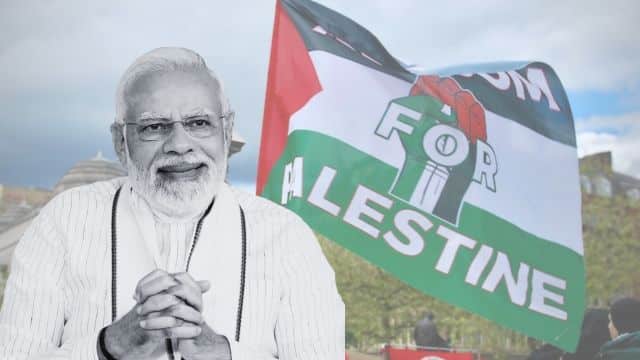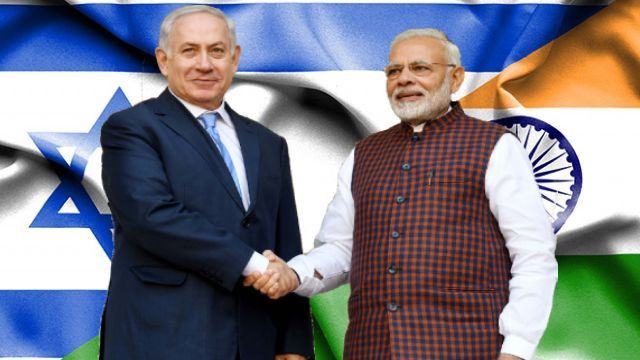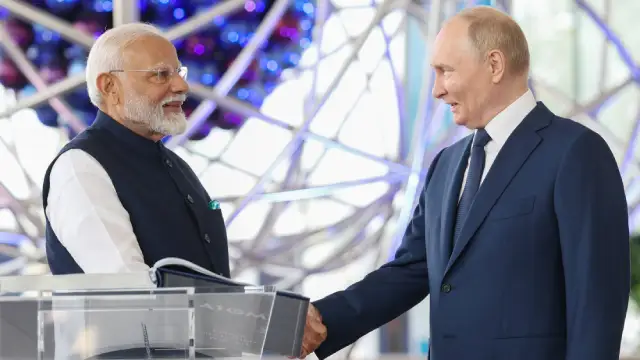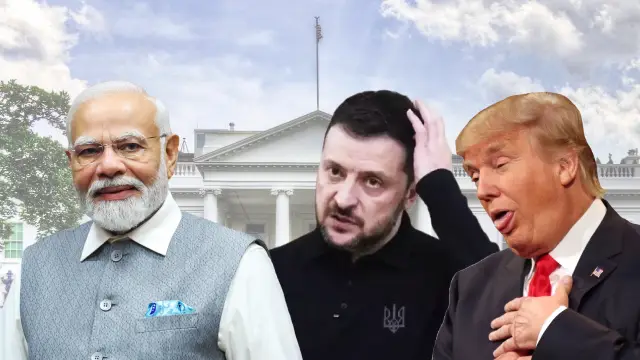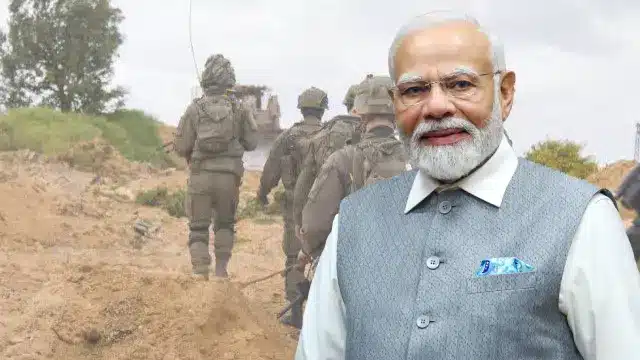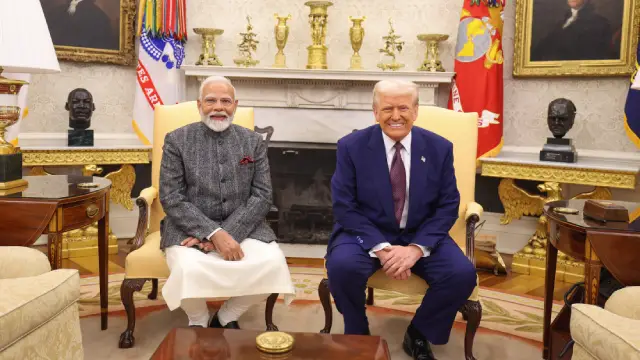India has been trying to project itself as a leading voice of the Global South using all international platforms, especially the G20 Summit held in New Delhi last month. It has been doubted that India’s efforts aim at reducing China and Russia’s influence on the Global South at the behest of the West. India’s stand on Palestinian resistance against Israeli occupation on Saturday, October 7th, revealed that Prime Minister Narendra Modi’s tall talks on the Global South are mere rhetoric to conceal New Delhi’s allegiance to the West.
Following the launch of “Operation Al-Aqsa Flood” by the Palestinian resistance organisation Hamas, Modi tweeted that his government stands in solidarity with Israel, which is isolated in the region and has been sustaining its alleged criminal occupation with the support of the West. Modi even went to the extent of calling the attacks “terrorist”, which resonated well with the Hindutva ideology of his federally ruling Bharatiya Janata Party (BJP).
When Palestinian resistance launched the hybrid war against the Israeli occupation forces in the Gaza Strip and the southern territories of the Zionist state, most Arab countries, with which India has been trying to improve its ties, stood in solidarity with Palestine. India’s diametrically opposite stand has also isolated New Delhi from its traditional allies in the region like Saudi Arabia and Iran, and jeopardised its efforts to curb China’s growing influence in the region.
India’s stand on Palestinian resistance against Israeli aggression
Modi called the Palestinian resistance’s attack on Israeli forces a “terrorist” act in a post on social media platform X (formerly Twitter). He declared India stands with Israel, which is against the traditional Indian foreign policy that promotes a peaceful solution to the hostilities between the two countries.
Supporters of Modi’s BJP started rampaging on social media calling the Palestinian resistance “terrorists” and expressing their solidarity with the Israeli aggression and even supporting it. On Saturday, when the tensions escalated, the Indian Ministry of External Affairs (MEA) refrained from seeking a ceasefire and issued a warning for Indian nationals working in Palestine.
Following Modi’s statement and India’s reluctance to take a neutral stand, the Indian mainstream press went against the Palestinian resistance and started vilifying the Palestinian people’s struggle to regain their lost lands and houses from Israeli occupiers. The Indian mainstream press followed the footsteps of their western counterparts and started milling pro-Israeli propaganda, which doesn’t conform with India’s traditional position on the Palestine issue.
Why is it wrong to support Israeli aggression?
India’s stand on Palestinian resistance against Israeli aggression arises from the wrong precinct of equating any form of resistance struggle with terrorism. Palestinian resistance groups have never been considered terrorists in the Global South. Even those who oppose their military actions against Israeli aggression, call them “militants” rather than “terrorists”.
However, by borrowing the Zionist parlance to vilify the Palestinian resistance, India has harmed its cause in the Middle East and the entire Global South. Most countries of the Global South, especially in Central Asia, West Asia, Africa and Latin America, support the Palestinian cause. India’s stand on Palestinian resistance and its solidarity with Israel won’t be acceptable to them.
The Palestinian resistance isn’t based on individual terrorism or indiscriminate violence. The Palestinian liberation movement, which was once supported by India, has been resisting Israeli aggression for the last 75 years. The new lease of attacks on Israeli occupation forces under Hamas’s “Operation Al-Aqsa Flood” took place due to the ongoing oppression unleashed by the Israelis on the Palestinian people.
Data shows that the number of people, including civilians, killed by Israeli aggression is far more than the casualties of Palestinian resistance. The following is the tally of the number of people killed by both sides between 2008 and September 2023.
Unlike the Palestinian militants, the Israeli forces are accused of arresting, killing and maiming innocent civilians, including women and children. Israeli forces have indiscriminately killed civilians, and even journalists and activists. The Israeli government has violated the Geneva Convention guidelines and other international rules to carry out its occupation of Palestine and to terrorise the Arab people.
Here is the data on the casualties of Israeli aggression on Palestine on Saturday and Sunday, following Hamas’s attacks and Israeli aggression.
Although concerns have been raised by different western powers following reports that the Palestinians have taken several Israeli defence personnel hostage, thousands of Palestinians, including women and children, are reportedly languishing in Israeli prisons in severe inhuman conditions.
Israeli attacks on innocent civilians are rampant and despite a lot of opposition from international human rights groups, the United Nations and the West remain mum on the issue of human rights violations by Israel.
The Gaza Strip is 365sq km (140sq miles), which is about the same size as the Indian city of Lucknow. However, the Gaza Strip, bordered by Israel and Egypt on the Mediterranean coast, has been under an Israeli blockade due to the rampant people’s struggle for freedom.
This map by Al Jazeera shows how Israel has trapped the people of the Gaza Strip using air, land and sea blockades since 2007.
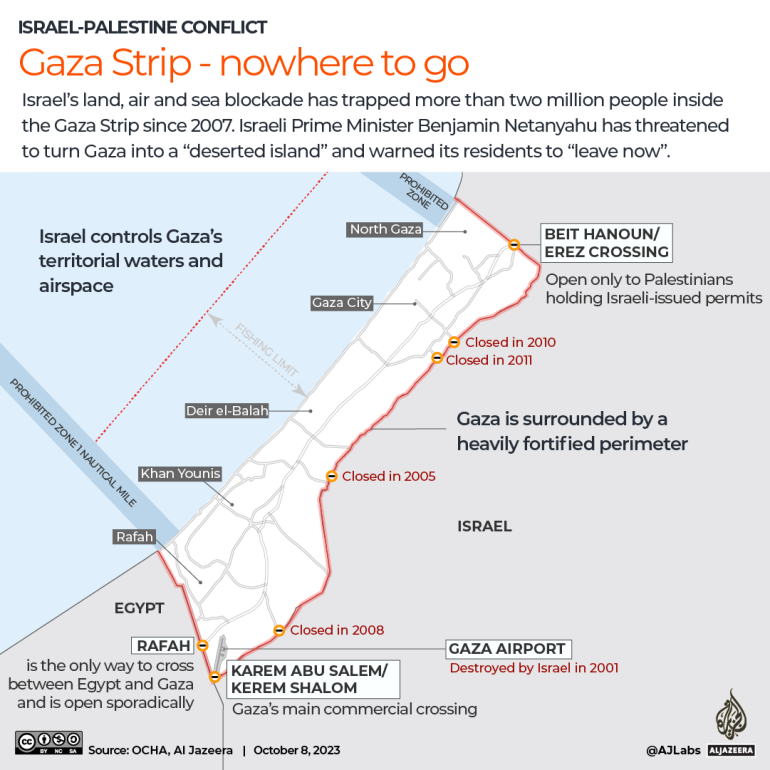
What’s Modi’s compulsion to support Israel?
Modi has several compulsions which has influenced India’s stand on Palestinian resistance and made New Delhi openly side with Israel discarding its foreign policy stand of maintaining neutrality and supporting a peaceful solution to the Palestine question.
Under Modi, India’s stand on Palestinian resistance against Israeli aggression has taken the utmost conservative turn. While one can blame it on the bonhomie between Modi and his Israeli counterpart Benjamin Netanyahu, there is more to this.
India has increased its dependence on Israel over the years to diversify its defence supplies and to reduce dependency on Russia, which is facing international sanctions. Apart from defence ties, India is also attempting to build a strong strategic partnership with Israel.
Recently, Gautam Adani, one of India’s richest men and allegedly close to Modi, acquired the Haifa Port in Israel spending $1.2bn. The Indian government initiated the process of building an India-Middle East-Europe Corridor (IMEC) during the sidelines of the G20 meeting. The IMEC is supposed to connect India with Europe through the Middle East, especially Saudi Arabia and the UAE. The Haifa Port may play an important role in the IMEC, along with other ports in India controlled by Adani.
Because of Adani’s business interests in Israel, Modi needs stronger ties with Tel Aviv. Therefore, it becomes imperative for New Delhi to oppose the Palestinian resistance struggle, which India has stopped supporting ever since it established diplomatic ties with Israel in the early 1990s.
Moreover, Modi’s government has been accused of using Israeli spyware technology named Pegasus to run surveillance on journalists, opponents of the BJP and others. India’s reliance on Israel’s defence and other technologies has caused a bondage that it can’t escape.
India’s Palestine policy
India didn’t have formal ties with Israel, except under Jawaharlal Nehru’s rule it sought Israeli help in its war with China. However, in the 1970s, when India grew closer to the Soviet Union, Nehru’s daughter Indira Gandhi’s government established ties with the Palestine Liberation Organisation (PLO) and opposed the partition of Palestine into two states – Israel and Palestine.
In the 1970s and the 1980s, due to Soviet influence on Indian foreign policy, India continued to support the Palestinian liberation struggle. However, after the collapse of the Soviet Union in December 1991 and after New Delhi switched to the neo-liberal economy, India officially recognised the Israeli state and established diplomatic ties with it.
Even after recognising Israel, and following the Oslo Accords, India continued to support the cause for an independent Palestine. But at the same time, it deepened its ties with the Israeli state in a bid to come closer to the West, with which it started renewing its ties.
Modi’s U-turn on Palestine
Although the Indian government has been pursuing a pro-Zionist standpoint since the 1990s in the international arena, it became more acute with the rise of the ultra-right Hindutva nationalists from the beginning of the 21st century. The MEA has been increasingly tilting towards the Zionist forces with Islamophobia becoming mainstream in Indian polity.
What Modi’s ascension did in 2014 is that it lifted the veil that covered India’s foreign policy’s pro-Zionist tilt and its growing aversion towards the Palestinian cause. During Modi’s rule, India’s former president Pranab Mukherjee visited Israel and so did Modi.
Modi’s Israel trip in 2017, and Netanyahu’s India trip in early 2018, helped deepen the ties not just between these two states but also helped strengthen the ideological ties between the Zionist lobby of Israel and the Hindutva camp of India. Their common axis is Islamophobia and support for a US-led militarist world order.
Although to balance his Israel trip, Modi visited Palestine in February 2018, it was merely a hogwash, his critics allege. During his Palestine visit, which was termed “historic” by the West Bank-based Palestinian Authority, Modi reiterated New Delhi’s support for a two-state solution to the Palestinian issue.
However, apart from the token visit, which critics allege was due to Modi’s attempt to woo the Arab countries from which India imports a large chunk of its fuel and where a large number of Indians are employed, there have been no attempts taken by the dispensation in assisting the Palestinian cause.
In the meantime, with Adani’s growing business interests in Israel, and the latter’s greater involvement in the Indian defence sector, the Modi government has focused on strengthening India-Israel ties, much to the dismay of the Arab world.
What will be the geopolitical impact of India’s stand on Palestinian resistance?
India’s stand on Palestinian resistance may become a boomerang for the Modi government, which has been pursuing the agenda of becoming the voice of the Global South vigorously at the behest of the West.
As India wants the leadership of the Global South by replacing China and, to some extent, Russia, to do ventriloquism on behalf of the West, its anti-Palestine standpoint and its open support for the Israeli state may become a spoilsport.
While the West, including the US and the UK, have unequivocally supported the Israeli aggression and opposed the Palestinian resistance against Israeli occupation, following Saturday’s strikes by Hamas, most countries of the Global South, including those in Africa, South America and West Asia, have supported the Palestinian cause and demanded a cessation of hostility.
In this situation, India’s stand on Palestinian resistance, especially its support for Israel, may spoil its efforts to counter China’s Belt Road Initiative (BRI) with IMEC in the Arab states, as well as its bonhomie with Iran, where it has invested in building the Chabahar Port. It can also impact India’s relationship and its efforts to influence the West Asian and African countries.
China and Russia have maintained a neutral position on the conflict. Both sides have called for an immediate cessation of hostilities and a peaceful settlement of the issues. Their position conforms with most of the Arab countries, even though both Beijing and Moscow have good bilateral ties with Israel.
Yet India’s stand on Palestinian resistance against Israeli aggression will have long-term repercussions as it’s already under the radar of different Arab groups for the growing incidents of communal violence and discrimination against Muslims. With New Delhi’s unapologetic solidarity towards Israel, it will be hard for the MEA to continue its endeavour of weaning away African and West Asian countries from China’s BRI project.
With the US facing an imminent financial crisis due to its ongoing funding of the war against Russia in Ukraine, it won’t be easy for US President Joe Biden’s government to support Tel Aviv for long by merely printing dollars. Experts anticipate that the economy of the US will suffer a major setback soon. In this case, neither can Israel continue flexing its military muscles for long nor can India make diplomatic gains by riding on the West’s dead horse.
For a truly multipolar world order and to seek a greater role in the Global South, it’s imperative for the MEA to take a neutral and pragmatic stand on the Palestine-Israel conflict. India’s stand on Palestinian resistance needs a change and New Delhi must use its influence on both sides to bring forth an immediate end to violent hostilities and to bring the parties to negotiation.
Rather than jingoistic rhetoric and chest-thumping, Indian foreign policy needs pragmatic solutions now, which are nowhere visible on the horizon, thanks to Modi’s pro-Zionist standpoint. If India’s stand on Palestinian resistance isn’t changed, it will continue to lose allies, which is the hardest thing to win in the world of diplomacy. Is South Block listening?
Tanmoy Ibrahim is a journalist who writes extensively on geopolitics and political economy. During his two-decade-long career, he has written extensively on the economic aspects behind the rise of the ultra-right forces and communalism in India. A life-long student of the dynamic praxis of geopolitics, he emphasises the need for a multipolar world with multilateral ties for a peaceful future for all.

